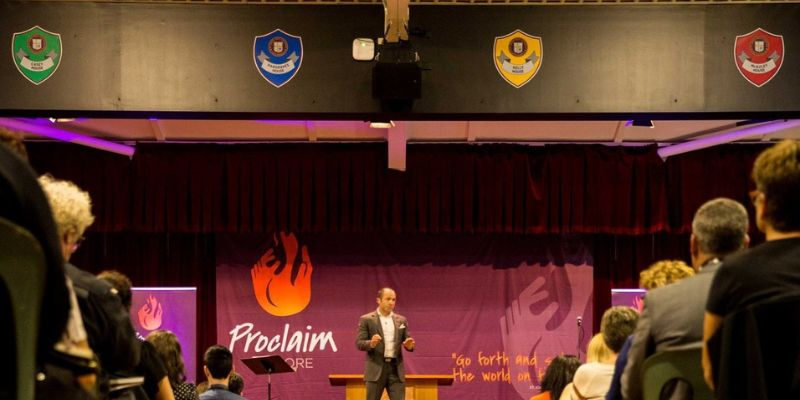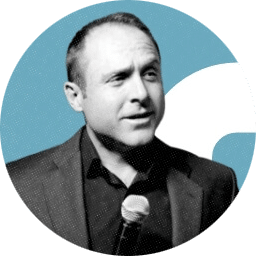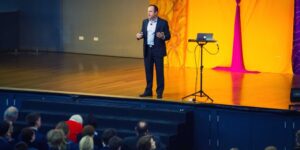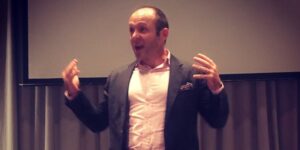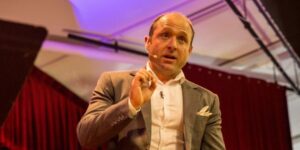Welcome back to the Catholic Teacher Daily Podcast! After a brief hiatus due to a tumultuous bike accident, I’m thrilled to be back in the studio with you. Join me, Jonathan Doyle, as we delve into crucial insights from Abigail Shrier’s provocative book, ‘Bad Therapy.’ Today, we tackle the pressing issue of Gen Z’s pervasive fear and anxiety, exploring its impact on mental health and the educational landscape. Are we, as educators, equipped to offer real hope amidst this prevailing sense of unease? Let’s embark on a journey of reflection and discovery, as we consider the transformative power of faith, discipleship, and the healing embrace of Christ.
Welcome Aboard
Hello there my friend, Jonathan Doyle with you. Welcome aboard to the Catholic Teacher Daily Podcast, wherever you are listening in the world. Regular listeners know I’ve had a short break, why? Because I have made another entry into the record book of my own life. In terms of trying to maim myself. It has been seven days since I got out of the hospital. I managed to have another bad bike crash last Tuesday morning. And I broke 12 ribs, I shattered my shoulder and fractured my collarbone, and the good surgeons have put enough metal in my shoulder to probably make airport security screening a little more complex than it once used to be.
Reflection on Personal Experience: Details of Recent Bike Accident
I know those of you that follow me on Instagram, you can find me @jdoylespeaks. I know many of you have seen some of the photos there and you can just follow the journey. But listen, I’m good, I’m stuck to be back in the studio. I’m really grateful for the incredible care that I’ve had from so many wonderful people. Just the beautiful support from so many people around the world has also been a great blessing. Look, I’m feeling okay, I’m still in a fair bit of pain and taking things a bit easier than normal.
My personal philosophy is I find it better just to get back on the horse and keep active rather than just sitting around. It’s what the doctors say. They say, get as active as you can and I’d probably take it a little too far. Just ask Karen, she’ll tell you. I’m just really glad to be alive and grateful for the amazing people that have made this last week a lot more bearable than otherwise would have been.
Embracing the Crucial Role of Catholic Education

So it is my pleasure to be back with you. I cared deeply about Catholic education, I care deeply about your important work as a Catholic leader or a teacher, whatever role you play in a Catholic school. And I just still have this belief, as I have for so long, that what you do every day is remarkable and that individual interactions with students can be truly transformative. We need to preach a crucified Christ, and we need to hold to the faith of the apostles. That we need to live our faith, to practice our faith, to share our faith with young people, and to live out the great commission in Matthew 28, to make disciples of all nations.
We don’t win my friends, we do not win if we simply turn out nice students, our job is not to make people nice. Our job is to create saints. Our job is to get people home to the house of the father and that’s why we do this podcast.
Challenging Cultural Norms and Mental Health Trends

So listen today, over the next few days, I want to share with you some insights from a really important book from Abigail Shrier. She is a controversial figure. Controversial in the sense, I think, because she just says the truth, and these days, if you want to be controversial, I think one of the most preeminent ways to do that is to say what’s true. Saying what’s true will get you canceled and it’ll make you controversial very quickly. Because on the other side of that equation, saying offensive, crazy, wacky things.
People have been doing that for a long time. Roger Scruton, my favorite philosopher who died a few years ago now. Wrote a lot about iconoclasm, how the progressive intelligentsia create forms of art that are always destructive. They create offensive art forms and the idea is to be as shocking as possible and as offensive as possible.
I don’t know if you agree, but I think we’ve gone so far down that road that it’s getting pretty hard to do it, right? Like it’s actually getting pretty hard to say anything. Or do anything that’s really offensive and crazy anymore because we’ve been putting up with it for so long that I don’t know what people do in that department anymore. I grew up in the late eighties and nineties, when people like Madonna were out there doing stuff and it was a big deal, but we’ve gone so far beyond that now. I think if you want to be really shocking these days, the smartest way to do it is to say and tell the truth.
Abigail Shrier has been, her first book was on I was on gender dysphoria, which pretty much got canceled everywhere. This new book is called “Bad Therapy”, and I have found it really interesting, and I do recommend it to you. It is a fascinating book for educators to read. Because it really spends a lot of time looking at the impact of the therapeutic model and how that has become an industry. How it’s affected young people in many ways. So I really do recommend it; it’s a great book.
Addressing Youth Anxiety: Culture of Fear in Gen Z

Today what I wanted to do over the next few days is draw out some key quotes from that and talk a little bit with you about how they impact ministry vocation in Catholic education. So the first question I’ve got for you today is this, and it says, she’s talking about the macro, the top-level view of what’s going on for young people in general? And she says, what seems to motivate a large portion of Gen Z – or Gen Zed, depending on where you live – is not hope or optimism or belief in themselves, it’s fear. They are arguably the most fearful generation on record.
A few weeks ago, I was speaking in Tasmania. Before the session started, we had a few hundred teachers in the room, and I was speaking to a group of, I guess, they had different names, but they would refer to themselves as TAs, or teacher assistants. And I asked them, I said, what are you seeing? What are some of the big ticket stuff that you’re seeing for young people? I wanted to make sure that the presentation that I was going to share was in the ballpark. This guy said fear, he said, they’re just so anxious. Anxious about study, they’re anxious about work, they’re anxious about uni.
“...what seems to motivate a large portion of Gen Z…is not hope or optimism or belief in themselves, it’s fear. They are arguably the most fearful generation on record.”
Abigail Shirer Tweet
Pathologization of Mental Health Issues
This level of fear and I don’t know what you think, I would imagine that you’ve encountered this. That you’ve encountered this growing anxiety in this emerging generation has been extremely pathologized in terms of mental health. All I want to say on the mental health piece is if you think about how enormous the mental health industry has become, then look at a couple of thoughts.
Critique of Mental Health Industry
One is that given the resources that we’re throwing at it, wouldn’t we tend to see things getting better? What kind of industry would it be if it attracted more and more people at the top of the funnel? So we were bringing more and more kids into that system. And fewer we’re emerging, healed and whole. I don’t know if that rolls you up, if you think that’s crazy. But I’m curious.
I think given the amount of resources that have gone into child and adolescent mental health, wouldn’t we be seeing some of the data trending in the other direction by now? I guess you could counter that by saying the problem is that it’s not working. It’s just that there’s so many more kids being affected. Maybe the culture that we’re living in is, and that raises interesting questions too. Doesn’t it?
Speculation on Cultural Influences on Mental Health

We’d ask ourselves, what is it about our culture that’s creating such pathology for young people? One of the things that Shrier mentions in the book, and you can take this up with her, is that she argues that the relentless focus on climate alarmism has had a profound effect on people. That the climate stuff has really affected large numbers of young people. They think there’s an apocalyptic approach to reality; what’s the point if the world’s just going to burn to the ground anyway, it’s going to be unlivable. So why bother?
I remember shortly after finishing high school, there’s a bunch of friends and I that were just so full of ideas. We’re all sort of pretty entrepreneurial and I remember we were just kicking around all these different ideas of businesses that we could start and things that we could do. Part of that’s the energy of youth, but I’m curious about where that went.
Now what we’re talking about, big picture stuff here. So there’s always going to be exceptions. There’s always going to be great kids who don’t struggle with this, and they’re going to be optimistic kids and hopeful kids, but I’m just wondering if we’ve set up a system where there’s so much fear in the air with through social media, through the news cycle, through the climate stuff that. I don’t know what you think about that. Maybe you think I’m just completely wrong, maybe Abigail Shrier is completely wrong. I’m just asking the questions. I’m curious about why we’re not seeing less anxious kids while we’re not seeing less depressed kids.
Exploration of Faith as Solution

So let’s park that and I’m wondering if there is a truly missionary dimension to Catholic education in light of that. By which I mean, if this is what the data is telling us, and the data is telling us that all the interventions don’t seem to be doing a great deal. Then I’m just wondering if a crucified Christ might be a very big part of the answer. By which I mean a discipleship relationship with Christ, who is all healing, He is the healer, He is the one who heals, He is the one who brings hope, He is the way, He is the truth, He is the light. Either that’s true or it’s not.
Either Jesus, when he said that, was telling us the truth. He was revealing to us the structure of reality itself. He was telling us the way to life, the way to truth is a person. And I am that person. And if you come into a relationship with me, then you are going to begin to move towards life and truth and healing.
Now if you’re like me and you live the Christian life long enough, you have enough maturity to say that becoming a Christian doesn’t make your problems vanish. No, it doesn’t. It doesn’t. Your life still goes on. I almost died last Tuesday and I was in hospital and I am in a lot of pain. Being a Christian doesn’t wave a magic wand. But what it does do is it changes how you experience and encounter those things. And you realize that there is a power and a spirit that can sustain and guide you in all of the vicissitudes of life.
The Therapeutic Model's Limitations
I just wonder what else we’ve got. We’ve definitely been throwing everything at the therapeutic model and the well-being model. If it was working, then let’s keep doing it, but it doesn’t seem to be working. I’m wondering if we helped young people experience prayer and the sacraments and help them understand forgiveness, help them to forgive others, help them to forgive themselves, and help them to extend forgiveness and live in. Because what else you got, you’ve got bitterness, you’ve got resentment, you’ve got rage, you got anger.
I hope you don’t think I’m trivializing any of this. It’s not my intent. My intent is I think it’s time that we, I’m speaking in a few weeks at a large event on masculinity for adolescent males. I just think the whole Marxist, presser analysis of masculinity hasn’t really done us a lot of good. But an image of masculinity that’s based on the sacrifice of cavalry that Christ is the exemplar of masculine strength poured out in the service of something beyond itself.
Comparison with Therapeutic Approaches
I’m just trying to say that if our faith doesn’t have the answers, you go back to John Paul II’s few days in Russia right. Some of you might be listening, he’s going to pray about everything, we’re not. Like I had this accident last week, right? And it took reason, it took the advances of science to create the medications and the technologies that allowed me to be back in the studio seven days later. But even those technologies emerged out of a Christian culture.
They emerged from a culture that understood certain aspects about reality. It’s both ends, so we can take whatever is good in science. So if the therapeutic approach has elements that are good and useful, then we should use those. But it looks as though to me, we bet the farm on that and we have diminished the profound capacity of faith and relationship with Christ to be transformative in the life of the individual.
Acknowledgment of Realities Faced by Young People
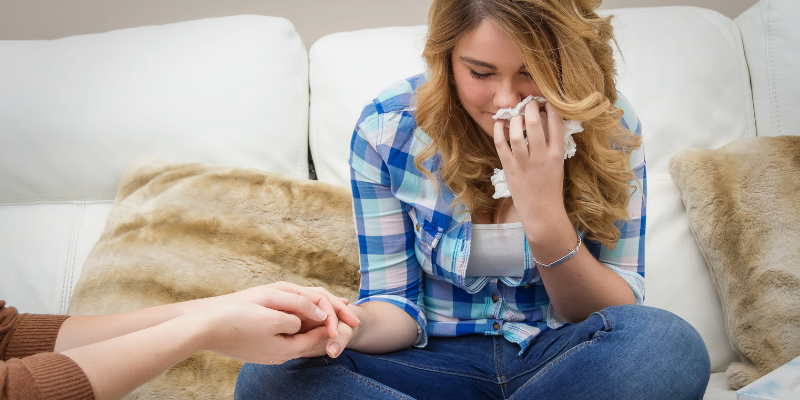
So my friend, we have a fearful generation, I think you’ll agree. The question isn’t are they fearful, the data seems to be pretty clear on that, on the anxiety and the mental health side. The question is how do we give them hope? If you think that another wellbeing program is going to do that, then maybe you should try that and see what happens. But I’m wondering if discipleship with Christ would actually end up giving them a lot more hope. And to finish that’s what you’re doing, that is what you’re doing every single day.
Do not be afraid to preach Christ, do not be afraid to teach them how to pray, do not be afraid to bring the sacraments back into the center of your school life, because he is the healer. Christ is the healer. He’s the one who heals. And I just think if you brought more young people into relationships with him, then he may be the one that can heal the brokenness and the hurt of their lives, and their hurts are real. I’m not discounting that they’ve suffered and that family dysfunction and breakdown and all sorts of things, social media, self harm, low self-esteem, all of that is a real thing. But I’m just wondering if we’re looking at the right solutions.
Call to Share

All right. Please subscribe to the podcast if you like it. If you found today interesting, I’d love for you to share it with people. There’ll be a bunch of links where you’re listening.
You can find me on the website jonathandoyle.co. I’m on Instagram @jdoylespeaks. God bless you. My friend, my name is Jonathan Doyle. This has been the Catholic Teacher Daily Podcast. And you and I are going to talk again tomorrow.
